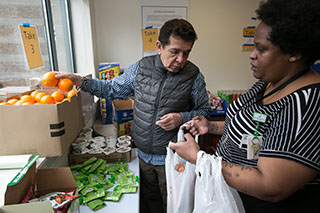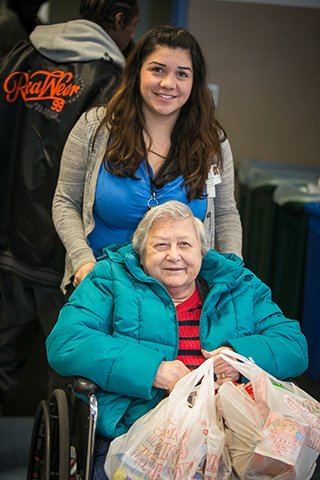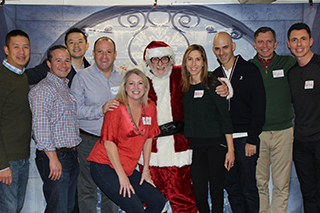Bailey-Boushay House Homefront Newsletter
March 2017 Edition
Inside this issue
Fighting Hunger for Better Health | Volunteer Organizations Make the Holidays Fun | Chefs' Dinner
Fighting Hunger for Better Health
 |
|
BBH Dietitian Shawntel Deloney assists client Luis as he does his monthly shopping.
|
Food bags help BBH clients face end-of-month food scarcity
On the day after Christmas, 91 Bailey-Boushay House clients went food shopping—without even leaving the building. Right down the hall from the Big Room where they gather every day, each client picked out enough free food to fill two grocery bags.
Another shopping event happened on Jan. 26, with the next one planned for the last week of February.
“Regular food banks aren’t set up to meet our clients’ special needs,” says Brian Knowles, Bailey-Boushay’s executive director. “So we’re trying out something new.”
Healthy eating without a kitchen
Half of Bailey-Boushay clients face homelessness—in addition to the challenges of living with HIV/AIDS, mental health issues, and chemical dependency. In 2016, 80 percent of new clients had no permanent housing.
Clients get a hot breakfast, lunch, and take-away snack at Bailey-Boushay every day. But they’re on their own from 4 p.m. to 6:30 a.m.
“With so little money, clients tell us they are starving by the end of the month,” Brian says. “Because they have nowhere to refrigerate, cook, or store food, they end up throwing away half the food they get at traditional food banks.”
Cans need openers. Fresh produce soon spoils. Nutritious lentils, beans, and pasta require a pot, clean water and a burner or microwave. A cooking staple like tomato sauce isn’t pleasant to eat cold from the can.
The power of choosing
“Our goal is to reduce hunger,” says Brian. Also, many client medications must be taken with food, increasing the urgency for regular meals. Access to food that’s shelf stable and ready-to-eat increases the chances of life-saving medication being taken successfully.
“We started by asking clients what they need and want,” he says.
At community meetings, client suggestions led to a better food plan. While all clients can get food bags, not all the food accommodates the needs of the homeless. Cans with pop-tops are easier to use. Single servings eliminate spoilage. And things that taste good cold work better for more people.
“We even tried stuff beforehand [in a community meeting] and chose what we would like,” says Glenda, a longtime client who was formerly homeless.
Turns out canned chili and clam chowder taste good cold, but tomato soup doesn’t.
Clients asked for a mix of stomach-filling basics and spirit-lifting treats. And they wanted to be able to choose the foods they actually like to eat.
“People deserve a choice,” says Brian. “We like choice, and it empowers us.”
How it works
 |
|
Client Barbara leaves with her selections and BBH care manager Gloria Johnson.
|
When people have lived with food insecurity for any length of time, they experience deep anxiety that can stay with them for years—even if they have food available.
“We worked hard to keep that anxiety at bay,” says Brian. “No waiting in line. No empty shelves. No being rushed to shop. No chance of missing out on a food choice.”
Throughout the first day volunteers Alisa B. and Danny K. restocked eight stations organized by food groups.
At the protein station, for example, clients could mix and match up to four items: plain tuna, packets of prepared tuna with crackers, Vienna sausages, Nutella and breadsticks, and peanut butter cups.
“They were really shopping,” Alisa says, “and it was fun!”
The two most popular food choices were canned chili and Pringles. One non-food item was also a favorite: a roll of high-quality toilet paper.
One client, who has been homeless for three years, compared his experience to other food banks: “There’s a lot of choice, and the choices are good. It’s more convenient being right here. And the food is higher quality. The volunteers were really helpful.”
Ways to measure success
Helping individual clients decide how many of each food group they wanted was rewarding to the volunteers.
“I was really excited clients were getting this food,” Danny says, “because it makes their lives better. And they were super-excited to get it. They kept thanking us.”
For Alisa it was an “exciting experiment” to be in on for the first time. “I love how Bailey-Boushay listens to client needs and comes up with creative ways to meet those needs,” she says.
She’s also impressed by the efficiency and immediate impact of the food bag experiment.
“At $25 for two bags, it’s a really good value for actually feeding people who are hungry,” Alisa says. “Donated money goes directly to people as food.”
Starting small, learning as we go
The food bag program at Bailey-Boushay—and a recently opened clothes bank—aren’t permanent programs at this time. They are pilot programs, made possible by donations to the Bailey-Boushay Homelessness Fund.
“We’re starting small and learning as we go,” Brian says. “This flexibility lets clients give us feedback that we can use quickly.”
Judging by early reactions of clients to the experiment—which ranged from delight (“Wow, great stuff!”) to gratitude (“a life-saver”)—food bags at Bailey-Boushay have already made an impact.
Back to Top
Volunteer Organizations Make the Holidays Fun
 |
|
Volunteers from the Young Professionals Organization helped provide a festive “Holiday Bingo and Santa Photo” event.
|
“Holidays can be challenging for some of our clients and residents,” explains Stephanie Pietras, volunteer services manager, Bailey-Boushay House. “Cold weather, sickness and lack of support outside of Bailey-Boushay can lead to difficult days.”
To bring some joy to BBH, two nonprofit groups joined forces. Volunteers from the Young Professionals Organization (YPO) and Seattle Works participated in BBH’s “Holiday Bingo and Santa Photos” event.
Time to Celebrate
“It was a great social time, especially for those who love to celebrate,” says Stephanie. “Our clients and residents had lots of fun. They played Bingo with the chance to win some awesome prizes from the YPO group. They also got the opportunity to take Santa photos with their friends and staff members.”
The volunteers helped at the event by assisting clients and residents with their Bingo cards and picking out prizes. Jessica was one of the YPO volunteers. “Our visit to Bailey-Boushay allowed us to connect on a personal level with two very special residents,” says Jessica. “By simply playing bingo with them, we were able to offer brief companionship on a winter afternoon. Our experience not only made them feel good, but we recognized that human connection is beneficial and powerful for all. We left that day really moved by our experience and we were equally impressed by the deep sense of community between the clients and staff at Bailey-Boushay.”
Back to Top
25th Annual Chefs’ Dinner raises $368,000 for the clients and programs at Bailey-Boushay House
On January 29, guests of the annual Chefs’ Dinner event celebrated 25 years since Bailey-Boushay House opened its doors. Thanks to their generosity, $368,000 was raised to help fund uncompensated care at Bailey-Boushay, ensuring the continuation of vital services to homeless and at-risk individuals living with HIV/AIDS.
Back to Top